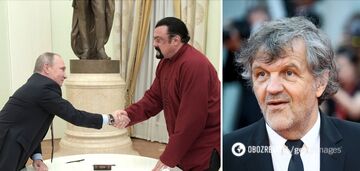
Emir Kusturica
Emir Kusturica (Serbian. Emir Kusturica, Bosn. Emir Kusturica; born November 24, 1954, Sarajevo, SFRY) is a Serbian film director of Bosnian descent who has won awards at major film festivals in Europe, including two Palme d'Ors at Cannes, and is a Knight of the Legion of Honor. In addition to his work in movies, Kusturica is known as a member of the rock band "The No Smoking Orchestra".
Filmography: "Do You Remember Dolly Bell" (1980), "Father on a Business Trip" (1984), "House for Hanging" (1989), "Arizona Dreams" (1992), "Underground" (1995) "Black Cat, White Cat" (1998) and others.
Emir Kusturica was born in Sarajevo on November 24, 1954 in a family of Muslims, but has Serbian roots. In the last grades of high school he played soccer and was going to sign a contract with a professional club, but because of the disease of the joints about the sport had to forget. Unexpectedly, Kusturica became interested in movies and shot an amateur film, which won an award. After graduating from high school, he went to Prague, where his father's sister lived.
"It was seventy-three years old, and I suddenly found myself in the heart of Europe, in the center of European civilization, in a museum city. It was a shock to my southern Balkan temperament," Kusturica recalls.
At the Prague Film Academy, he studied at the directing department under such masters as Otakar Vavra and Jiri Menzel. Kusturica had the opportunity to see everything that came from the East and the West, unlike many colleagues who were oriented either one way or the other. His thesis work "Guernica" (1976) won the top prize at the Karlovy Vary Student Film Festival.
After graduating from the film academy in 1977, Emir returned to Sarajevo and began working for television. He made short films and played guitar in a rock band in the evenings. His first feature film, "Do You Remember Dolly Bell" (1980), won the Special Award for Debut and the FIPRESCI Prize at the Venice-81 Festival. Emir at this time was in the army, and he was sent straight from the barracks to the Lido, in the thick of the cinematic carnival.
In the movie "Do You Remember Dolly Bell", together with the writer Abdulah Sidran, Kusturica told the story of a "young man entering life", on the outskirts of Sarajevo in the early sixties. The young hero learns class discord and social demagoguery, the strange and duplicitous actions of adults, the disintegration of the family, first love, the world of the city bottom... "This is the autobiography of an entire generation, even several," the director emphasized. Already at the age of twenty-six Kusturica - or, as his friends call him, Kusta - received the unofficial title of "Filmmaker of the twenty-first century".
The hero of his next film "Father on a Business Trip" (1984), innocently suffered in the late 1940s because of the quarrel between Stalin and Tito, must go for several years in a labor camp for re-education. This movie, like the director's first film, was considered anti-socialist by some and Stalinist by others. Meanwhile, Kusturica told only about the indomitable will to live. The film was awarded the Palme d'Or, and the chairman of the Cannes jury Milos Forman declared the 30-year-old director from Yugoslavia hope of European and world cinema.
In 1989, Kusturica showed his "Time of the Gypsies" (original title - "House for Hanging") at Cannes. He grew up in the neighborhood of the Roma community and learned his first lessons of friendship and freedom from the Gypsies. At one time, Kusturica was said to be the Roma Fellini. "The parables of the Bosnian director are allegorical, deep in meaning, but simple and aphoristic - almost like biblical" - writes film scholar S. Kudryavtsev.
In interviews, Kusturica is often presented as a rock musician, who by some misunderstanding makes movies between rehearsals. He often talks about how he should have been a writer. He recalls his grandmother, who had to walk five or six kilometers to get from a mountain village to the market, but people met her everywhere with the words "Hello, neighbor. Kusturica assures that the same way he was later welcomed in Paris and New York, and that this feeling of openness of the world today is more important than talent.
At the age of thirty-six, as a maestro of world cinema, he began teaching film direction at Columbia University. Making "Arizona Dreams" (1992), Kusturica tried to fit into the Hollywood system without losing his identity. The film introduces the viewer to the amazing people, each of whom in their own way trying to realize their dreams someone - to fly to the moon, someone - just go up in the air, someone - to become an actor, and someone - to live among the Eskimos. "Dreams" is marvelously romantic - with flying fish and narrow-eyed Eskimos, with marvelous Arctic landscapes. "The viewer is plunged into a whirlwind of images that are marvelously graceful and carry an inexplicable charm. The episodes are strung one on top of the other in such a way that it is almost impossible to predict the development of events, but the story is told clearly and distinctly," writes French critic Erica Libio.
A turning point in the fate of the director was the film "Underground" ("Underground") (1995), which brought Kusturica second "Palme d'Or". The picture was presented as the triumph of the decade, a novel-epic, comparable to "War and Peace". Emir turns to the fate of refugees who want to hide from the horror of the bloodbath in their homeland. He embodies the modern plot in the form of a parable.
After the screening of "Underground" Bosnian television began to present the director as a monster, the Sarajevo administration began repression against his family. Emir's mother was forced to move to Montenegro. As in the case of "Arizona", Kusturica spent a long time editing the film before releasing the final version. The tone of many reviews, despite the Cannes triumph, was so murderous that Kusturica announced his departure from the movie. The poisoning was unleashed by left-wing French philosophers and critics, who considered "Underground" politically incorrect and pro-Serbian picture (which is hardly true Kusturica tried to understand the causes of the Yugoslav wars).
"These people," the director later said, "have been politicking all their lives. They, together with their allies, formed Yugoslavia after the First World War, and they destroyed it".
Having decided to abandon the movie, Kusturica started a small project for German television about gypsy music called "Music-Acrobatics. Out of this idea came the feature-length movie "Black Cat, White Cat". The story of happy love is played out on a colorful folklore background and decorated with Gypsy music. The spectacle is entertaining, energetic, exotic. "Cats" at the Venice Film Festival was greeted with a standing ovation. This is perhaps the first film by Kusturica, which the audience liked more than the experts at the festival, he received not the "Golden Lion", but only the jury prize for directing.
"I returned to Life, Colors and Light," the director said. - This kitsch, which is inherent in Roma, intrigues me precisely because of its emotional power. This kind of kitsch breaks the boundaries of any genre. It's a kind of mockery. They don't take anything seriously, and I really like that. I feel like I've come home. They say they live nowhere - between heaven and earth. In a way, it reminds me of my life too."
In recent years, Kusturica has lived and worked in Belgrade, Paris and New York. In addition to directing, he occasionally dabbles in literature - writing scripts for other directors, as well as playing bass in the band "Smoking is forbidden" and playing soccer regularly. He prefers to speak English and persistently refers to himself as a Yugoslav, the Emir of a non-existent country. Together with Quentin Tarantino, he is called the director of the XXI century.



